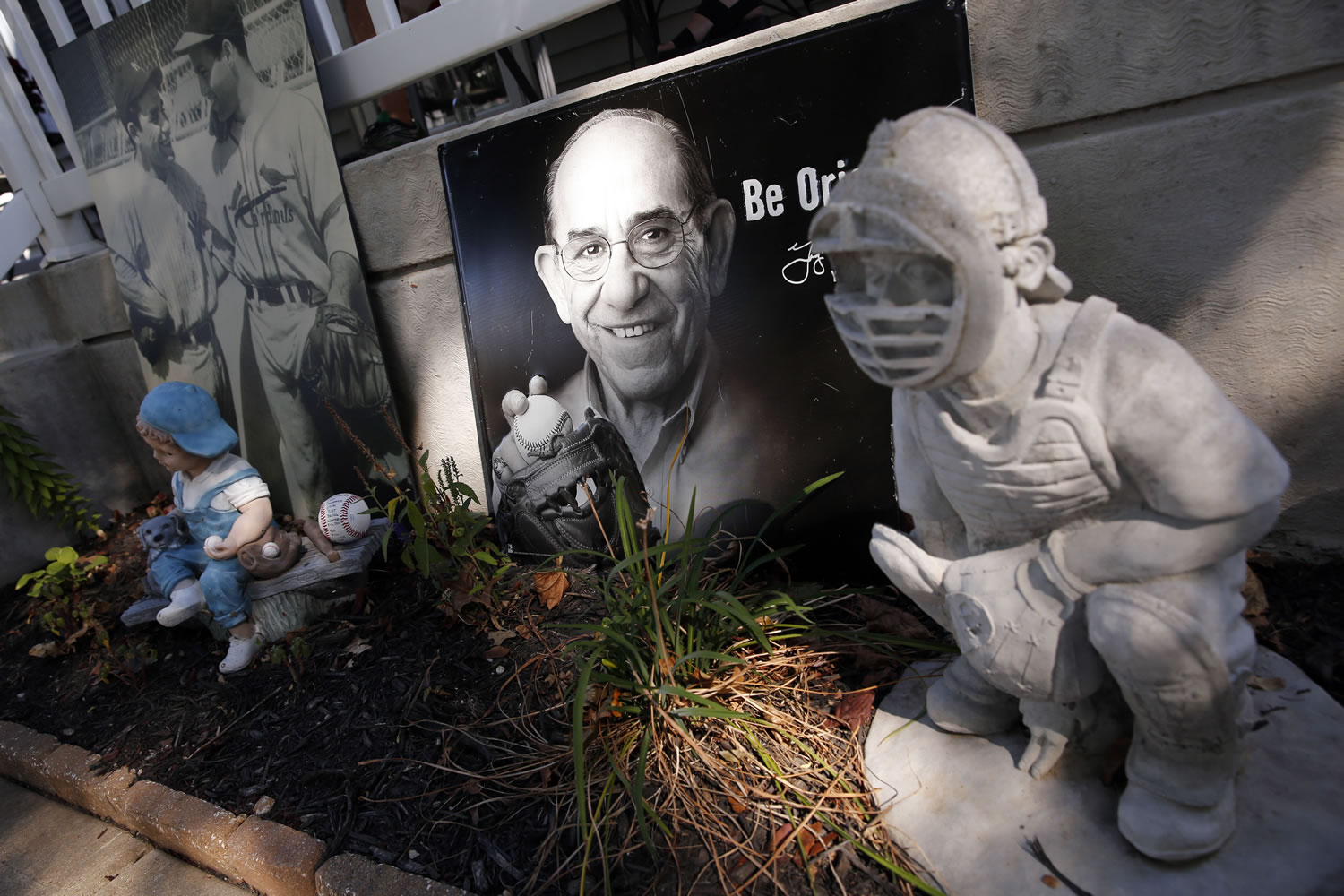TORONTO — Yogi Berra, whose uncommon gifts as a player and common man’s persona made him a legendary figure in Yankees history and delighted generations of baseball fans, has died at the age of 90.
“It is with heavy hearts that we share the news that Yogi Berra passed away Tuesday night,” the Yogi Berra Museum and Learning Center sent out via Twitter Wednesday. Berra broke into the majors with the Yankees exactly 69 years ago on the day of his passing.
“While we mourn the loss of our father, grandfather and great-grandfather, we know he is at peace with Mom,” said a statement from Berra’s family. “We celebrate his remarkable life, and are thankful he meant so much to so many. He will truly be missed.”
A three-time AL MVP-winning catcher and 10-time world champion playing in pinstripes from 1946-1963, Berra also managed the Yankees and Mets to a pennant and received World Series rings as a coach for both New York clubs.
And yet, Berra’s influence crossed from the ballpark into popular culture with his homespun observations on life — a collision of grammar and thought that came to be known as Yogi-isms.
Some were directly attributable, such as “It ain’t over ’til it’s over,” Berra’s quote about managing the 1973 Mets from last place in August to the NL championship.
During his 1972 Hall of Fame induction speech, Berra reprised one of his oft-quoted gems by thanking “everyone who made this day necessary.” As the collection of malapropisms and off-beat statements grew, Berra had a ready line about them: “I really didn’t say everything I said.”
“They say he’s funny,” Casey Stengel once said of Berra. “Well, he has a lovely wife and family, a beautiful home, money in the bank, and he plays golf with millionaires. What’s funny about that?”
A resident of Montclair, N.J., for more than 50 years, Berra’s wife, Carmen, predeceased him in 2014, shortly after a Broadway play — “Bronx Bombers” — featured the Berras as central characters. In 1998, the Yogi Berra Museum and Learning Center was established on the campus of Montclair State University, adjacent from Yogi Berra Stadium.
Born on May 12, 1925, in St. Louis to hardworking immigrant parents, Lawrence Peter Berra grew up in that city’s Italian-American neighborhood known as “The Hill,” playing baseball, soccer and football. His best friend who lived across the street, Joe Garagiola, would also become a Major League catcher and a noted broadcaster.
Berra’s traditional schooling ended after eighth grade so he could help earn money for his family. He’d received his lifelong nickname from a friend who witnessed the stocky Berra sitting cross-legged, resembling a yogi.
After Garagiola had signed with the hometown Cardinals for $500, Berra refused St. Louis general manager Branch Rickey’s $250 offer and accepted a $500 bonus from the Yankees at age 17.
A year later, he was a Second Class Seaman in the U.S. Navy during World War II and was part of the third wave of troops in the Normandy Invasion.
A gunner’s mate on a 36-foot rocket boat, Berra told sports broadcaster Keith Olbermann of the experience: “I thought it was like the Fourth of July … all the planes coming over. And I was looking out and my officer said, ‘You better get your head down in here if you want to keep it on.’ “
By ’46, Berra was called up to the Yankees and tutored as a catcher by Yankees’ great Bill Dickey.
Berra would catch both of Allie Reynolds no-hitters in 1951 and Don Larsen’s perfect game against the Brooklyn Dodgers in the 1956 World Series, famously leaping into the right-hander’s arms at Yankee Stadium.
With legendary teammates such as Joe DiMaggio, Mickey Mantle and Phil Rizzuto, Berra was part of the Yankees’ record five consecutive world championships from 1949-53, winning MVPs in ’51, ’54 and ’55.
From 1948-58, Berra averaged 25 home runs and 102 RBI per season. Known as a bad-ball hitter, Berra was still a disciplined enough left-handed swinger to hit 358 home runs with just 414 career strikeouts.
In 1950, a year he finished third in the MVP voting, Berra batted .322 with 28 homers, 124 RBI, and struck out just 12 times. When asked about that astonishing statistic, Berra said simply: “I didn’t like to strike out.”
And he struck a chord with the public beyond the Bronx.
What other ballplayer had the appeal to be a pitchman for a chocolate drink, Yoo-Hoo, wind up in Bartlett’s Familiar Quotations and appear in a movie — “That Touch of Mink” — with Cary Grant and Doris Day?
As a manager, Berra led the Yankees to the 1964 pennant, but was replaced by Johnny Keane — whose Cardinals beat the Yanks in the World Series — in 1965.
Promised by owner George Steinbrenner that he’d last the entire season as manager in 1985, Berra was fired after 16 games and replaced by Billy Martin — a slight that led to Berra’s 14-year Cold War with the Boss.
In the interim, Berra became a coach with the Houston Astros, mentoring the likes of future Hall of Famer Craig Biggio.
Berra’s disassociation with the Yankees ended when Yankees broadcaster Suzyn Waldman brought Berra and Steinbrenner together for a reunion.
Afterward, Berra was a fixture again at Yankee Stadium, through the Joe Torre era and into Joe Girardi’s tenure as manager, sharing a laugh — and his stories — with a new generation of champions in Bernie Williams, Jorge Posada and Derek Jeter.



